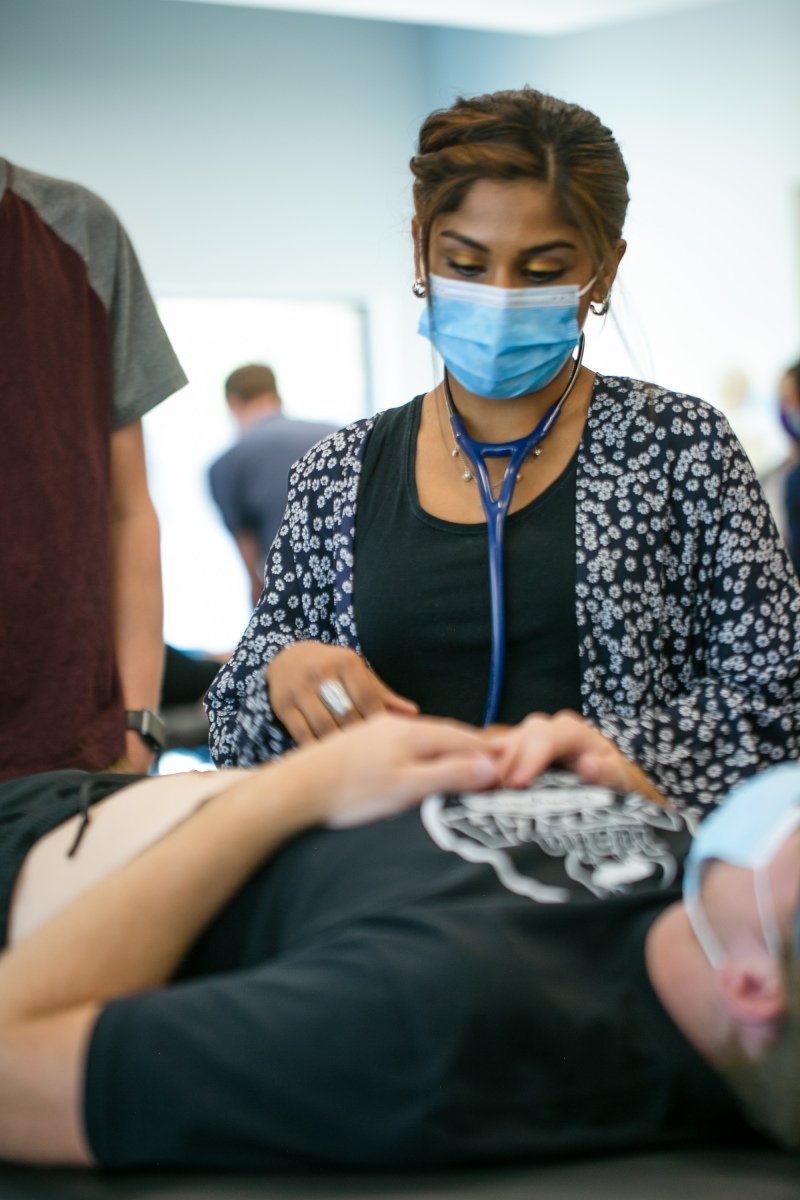Foundations Phase
See also the University of Washington School of Medicine’s Foundations Phase page
Idaho WWAMI students begin their training at the University of Idaho, where they will complete the first 18 months of curriculum, also known as the Foundations Phase.
Key components of the Foundations Phase are:
- An early immersion period with instruction in basic clinical skills ensures that students are ready to work with patients during the patient care portion of the Foundations Phase.
- Basic science instruction is organized in short blocks of instruction with each block consisting of related, integrated topics. The blocks are organized to emphasize active and team-based learning content in cross-cutting scientific areas, such as pathology, anatomy and pharmacology.
- A longitudinal clinical experience focused on clinical skills, primary care, chronic care and continuity of care.
Students spend a half-day each week out of the classroom working with physicians, faculty and other health professionals in patient care settings as well as completing special experiences like visiting labs, completing simulations, etc.

Course-Based Curriculum Blocks
An integrated curriculum including biochemistry, genetics, molecular biology, pathology, histology, pharmacology and anatomy.
Immune system, microbial biology, infectious diseases, inflammation and repair and skin-connective tissue.
Cancers, endocrine system, heme/lymph, palliative care.
An overview of anatomy, the skeleton, dermatology and rheumatology.
Cardiovascular system, respiratory system, renal-urinary system, multi-system fluid balance.
The pulmonary and renal systems.
Metabolism and nutrition with a focus on biology of the alimentary canal including diabetes and other metabolic disorders and syndromes and gastrointestinal physiology.
Also known as “Triple-I,” students complete an Independent Investigative Inquiry (III) project in one of five areas during the summer after their first year.
- Data-gathering/hypothesis-driven inquiry: This selective can take the form of a basic laboratory study, a survey, secondary analysis of an existing dataset, a chart review, a qualitative study or a prospective clinical trial. The Medical Student Research Training Program (MSRTP) is part of this selective. MSRTP provides approximately 40 funded opportunities each year for students enrolled at the University of Washington School of Medicine to participate in a full-time, 10-week summer research project between their first and second years under the supervision of a faculty mentor.
- Critical review of the literature: A critical review of the literature poses an unresolved scientific question relevant to the practice of clinical medicine and attempts to answer that question using evidence published in medical literature.
- Experience-driven inquiry – Rural/Underserved Opportunity Program (RUOP): RUOP is a 4-week elective immersion that provides students an opportunity to work side-by-side with a physician preceptor, providing care to either rural or urban underserved populations. Students will closely observe health care in a community setting then develop a project based on those observations. The project could take several forms, including a community needs assessment, a plan for a community health intervention, or evaluation of a service delivery project.
- Special simulation selective: The student will have the opportunity to research and develop the content for one or more simulated patients.
- Promoting community health in developing countries: This option is for students with a strong interest in global health and underserved communities and is particularly suited to students on the Global Health Pathway.
Neuroscience and neurology, neurosurgery/trauma, sensory systems (ophthalmology/otolaryngology), psychiatry, anesthesia.
Lifecycle, reproductive system.
Preparation for USMLE Step 1, transition to clerkships.
Threads
Certain core competency areas are woven throughout the curriculum - hence their name: threads.
Scientific threads include pharmacology, histology and pathology, and anatomy and embryology. Clinical threads include clinical experience and clinical skills.
The curriculum also covers themes (areas identified as important to integrate into the blocks, clinical threads and clerkships: primary care; population health, health equity and global health; diversity, communication and interprofessional education; professionalism and ethics; lifelong learning and scholarship).
Non-Clinical Electives
Non-clinical electives are courses relevant to medical education but not involving direct patient care. Non-clinical electives are offered within Foundations Phase intersessions and during other non-required blocks of time.
Examples:
- Spanish for the Health Professional teaches vocabulary and pronunciation of words to conduct an interview/patient history and perform a physical examination.
- Indian Health teaches how to use medical resources to solve clinical problems and understand how Native Americans utilize traditional Indian medicine for their health care.
- Alternative Approaches to Healing explores philosophies and practices of the major alternative approaches to healing accompanied by presentations by practitioners of chiropractic, naturopathic, homeopathic and traditional Chinese medicine.
- Wilderness Medicine provides didactic and field experience in medical emergencies and situations unique to rural and wilderness settings, including, but not limited to, patient assessment, extrication, trauma, burns, water rescue, hypo/hyperthermia, toxins and high-altitude.









